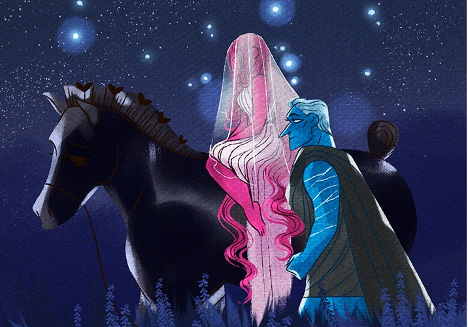How Retellings Are Keeping Mythology Alive

December 9, 2022
Greek Mythology has become a major influence in pop culture recently. Greek culture in newer retelling novels and series have made notable achievements in popularity, while educating more and more people on this fascinating part of history. One of the most popular re-telling topics is the story of Hades and Persephone, which most fail to acknowledge the dark realities of the classic myth.
In classic Greek myth, Hades (the god of the Underworld) comes across Persephone (goddess of spring) and immediately is infatuated with her beauty and kindness. He kidnaps her with the help of Zeus, and they agree to let Persephone spend six months in the mortal realm and six months in the Underworld each year in order to “keep her content”. Her cycle from the Underworld to the mortal realm was said to make the seasons. While Persephone was in the mortal-realm it was spring and when she returned to the Underworld it was winter.
While with Hades, Persephone is persuaded to eat a pomegranate that binds her to the Underworld. Initially Persephone hated Hades, but eventually she fell in love with him and they both lived happily as the King and Queen of the Underworld.
The Webtoon series Lore Olympus created by Rachel Smythe follows Persephone’s journey into becoming queen of the Underworld. The series has accumulated 1.2 billion views and has won both a Harvey Award for “Digital Book of the Year” and an Eisner Award in the “Best Webcomic” category. The series has moved on from being exclusively online to being published in book stores. Smythe gives her own spin to the story of Persephone and Hades, while also incorporating the other gods and goddesses’ drama-filled lives. In this retelling, Hades and Persephone are madly in love, and the “kidnapping” incident was kind-hearted contrary to true Greek myth.
However, in true Greek myth it is unclear if Hades and Persephone were loyal to each other. There’s no doubt that they both loved each other overtime, but was Hades like his fellow brothers? Zeus and Poseidon were obviously unloyal to their wives (hence all their children with random mothers), but there has never been a clear story as to if Hades ever cheated on Persephone. Some sources say that he had a few affairs (not as many as other gods), and some say he stayed loyal to his Queen. As for Persephone, all sources say she was pursued by other mythical figures, but always turned them down for her King. Regardless, it’s fun to imagine at least one healthy couple in Greek mythology.
Another popular re-telling is the “Song of Achilles” by Madeline Miller. The story follows the Greek warrior Achilles and his companion Patrocolus as they train for and fight in the Battle of Troy. The two fall in love and face a tragic end to their journey. While it is not confirmed that Achilles and Patrocolus were partners in ancient myth, it is not an absurd thought. Homosexuality was not uncommon in ancient times, and gods/goddesses would be with each other often. Not only did Miller write “Song of Achilles”, but multiple other popular retellings such as “Circe” and “Galatea”.
Greek mythology isn’t the only type of history being re-told. Chinese, Norse, Egyptian, and more types of mythology are influencing new forms of media. It’s obvious these fictional stories are intriguing, and it’s up to re-tellers and readers to keep the history alive.


